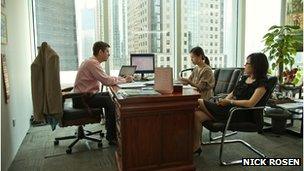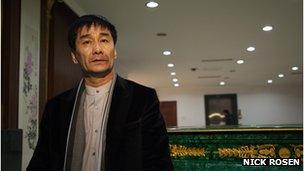From rich list to death list, China's road to wealth
- Published
Hong Weihua is a survivor.
The former soccer player turned financier has built a conglomerate stretching from media and mining to pharmaceuticals and retailing.
A decade ago, the 54-year-old was named on a list of the top 30 entrepreneurs in his native town - Shenyang in northeast China. Many of the others are now bankrupt or in jail.
Away from the top-tier cities, Mr Hong's success is more than most a microcosm of modern China's rise to economic pre-eminence. Like a majority of the Chinese super-rich his wealth is hidden.
Although the Hurun rich list only credits him with a fortune of $320m, researchers agree that his wealth is five times that.
"But you can't put your finger on it" says Hurun's founder Rupert Hoogewerf. It's the nature of the "Wild East" of China that most assets go unrecorded.
Paddy-field to palace
Rupert Hoogewerf is possibly the best-known foreigner living in China today.
He is the founder of the Hurun Report, publisher of magazines about private jets and yachts, private schools, and private wealth - and world-renowned for its annual listing of the richest 1,000 people in China. His views are highly sought after by Chinese radio and TV.
Mr Hoogewerf, educated at Eton College in England, then at Durham University where he graduated in Chinese and Japanese, says he just happened to be "in the right place at the right time."
He records the wealth of people like Hong Weihua, who, like China itself, has moved from paddy-field to palace in a single generation.
Visiting his father, who could never have expected to grow old in a garden villa with a full refrigerator, Mr Hong recalled his late mother: "She was a great mother. She used to eat last when the family was very poor in the old days. She usually got nothing to eat in the end. We got something solid to eat - but she only got soup.

Rupert Hoogewerf keeps track of China's super rich
These days, 54-year-old Hong's proudest possession is a Jade piano worth at least $2m (£1.3m), formerly the property of the late singer Michael Jackson, and before that, he says, an Empress of Russia.
In his office we were joined by friends and his son Michael for dinner, and sipped shots from a $16,000 bottle of aged rice liquor.
Mr Hong's enjoyment of the trappings of success is all the more acute because he has experienced near-disaster in his business dealings.
A decade ago his business partner in a property development was jailed for 18 years. Ten years before that, as he began the process of building his fortune, he was nearly killed by wolves as he prospected for minerals on the Inner Mongolian border.
Customised minibus
Now he can reflect that he has made the most of his "second life."
He is helping British supermarket chain Tesco open stores across Shenyang, and his long-standing connections with the local Communist Party mean he has access to land and finance when he wants to expand.
"My supermarket is worth two billion while it's not listed in my account," he told me as we drove across town facing each other in the back of his customised minibus with a bar and mood lighting.
It is that hidden wealth that defines the business environment in modern China.

Hong Weihua owns a jade piano he says belonged to a Russian empress
Rupert Hoogewerf sees his wealth list as "like the tip of an iceberg - there is a lot more underneath than you can see on the surface."
Mr Hoogewerf freely admits that listing only published assets means he misses at least half of the truly wealthy in a country where it is difficult to track any assets that are not held in land or publicly listed companies.
Perhaps that is the reason why his presence has been tolerated for so long in a country not known for its openness about wealth or anything else.
When he first set up Hurun, he told me, he received a discreet visit from a man with no business card who just said: "We know what you are doing. It seems quite good."
'Fat pig killing list'
But although the Party might find his list quite useful, those who are included in it are often not so relaxed.
"There is a nickname for the rich list. It's called the death list," Mr Hoogewerf says in our interview, "...or in Chinese it is actually known as the 'fat pig killing list'. The implication is that as the Chinese get to be well known, they get ready to be taken down."
Mr Hoogewerf quotes statistics to show this is a false impression, and that those on the list are no more likely to be arrested than any other businessmen in a society where incurring the Party's displeasure can mean a quick end to a promising business career.
But other researchers disagree.
One paper, external from three Chinese academics says that the proportion of entrepreneurs that are charged, investigated or arrested rises from 7% for unlisted to 17% on Hurun listing.
Mr Hoogewerf strongly disputes this, saying the proportion of listees arrested is no more than 1%.
Video produced by Vivum Intelligent Media Ltd, external
International viewers can watch more on China's Super Rich on BBC World News on Saturday 24th November at 0030 and 0730 and on Sunday 25th November at 1230 and 1830. All times GMT.